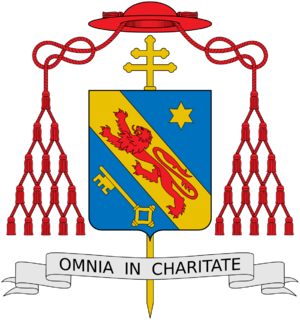Léon-Étienne Duval facts for kids
Quick facts for kids His Eminence Léon-Étienne Duval |
|
|---|---|
| Archbishop of Algiers | |
 |
|
| Church | Catholic Church |
| Archdiocese | Algiers |
| Appointed | 3 February 1954 |
| Reign ended | 19 April 1988 |
| Predecessor | Auguste-Fernand Leynaud |
| Successor | Henri Teissier |
| Opposed to | Imperialism, Algerian War |
| Orders | |
| Ordination | 18 December 1926 |
| Consecration | 11 February 1947 by Auguste Cesbron |
| Created Cardinal | 22 February 1965 |
| Personal details | |
| Born | 9 November 1903 Chênex, Haute-Savoie, France |
| Died | 30 May 1996 (aged 92) Algiers, Algeria |
| Buried | Basilica of Our Lady of Africa, Algiers, Algeria |
| Nationality | |
| Previous post | Bishop of Constantine (1946–1954) |
| Alma mater | Pontifical French Seminary |
| Motto | Latin: In caritate omnia (In Love of All Things) |
Léon-Étienne Duval (born November 9, 1903 – died May 30, 1996) was an important French cardinal and church leader. He served as the Archbishop of Algiers from 1954 to 1988. He became a cardinal in 1965. Cardinal Duval was known for supporting Algeria's independence and working for peace among different religious groups.
Contents
Life of Léon-Étienne Duval
| Styles of Léon-Étienne Duval |
|
|---|---|
 |
|
| Reference style | His Eminence |
| Spoken style | Your Eminence |
| Informal style | Cardinal |
| See | Algiers (emeritus) |
Early Life and Priesthood
Léon-Étienne Duval was born in Chênex, a town in Haute-Savoie, France. He studied to become a priest at a seminary in Annecy. Later, he continued his studies in Rome.
He became a priest on December 18, 1926. After that, he worked in churches in Annecy until 1942. During this time, he also taught at the seminary. During World War II, Duval supported the French Resistance. This group fought against the occupation of France.
Becoming a Bishop and Archbishop
On November 3, 1946, Pope Pius XII chose Duval to be the Bishop of Constantine. He officially became a bishop on February 11, 1947. Bishop Auguste Cesbron led the ceremony.
Later, on February 3, 1954, Duval was named the Archbishop of Algiers. This was a very important role in the Catholic Church in Algeria.
A Voice for Peace and Independence
Archbishop Duval strongly supported Algeria becoming an independent country. He worked hard to encourage peace among Muslims, Christians, and Jews living there. In 1962, during the Algerian War, he spoke out against the violence. He called it "an offense against God."
He also took part in the Second Vatican Council. This was a major meeting of Catholic leaders from 1962 to 1965. Duval helped deliver one of the closing messages of the Council. From 1963 to 1988, he was the President of the North African Episcopal Conference. This group represents Catholic bishops in North Africa.
Duval believed that faith and politics should remain separate. He was a schoolmate of Archbishop Marcel Lefebvre. In 1976, Duval encouraged Lefebvre to follow the authority of the pope.
Becoming a Cardinal
Pope Paul VI made Léon-Étienne Duval a cardinal on February 22, 1965. This is one of the highest ranks in the Catholic Church. As a cardinal, he helped choose new popes. He participated in the elections in August and October 1978. These elections chose Pope John Paul I and Pope John Paul II.
In challenging times, Cardinal Duval made decisions to protect his priests and the Christian community. He wanted to ensure their safety.
Later Life and Legacy
Because of his work for peace and against colonialism, Duval was chosen for a special mission. In 1979, he was one of four religious leaders to visit hostages held at the American embassy in Tehran. This visit happened on Christmas Day.
On April 19, 1988, he retired as Archbishop of Algiers after 34 years of service.
Cardinal Duval passed away in Algiers on May 30, 1996, at the age of 92. He is buried in the Basilica of Our Lady of Africa in Algiers. After his death, Pope John Paul II said that Duval would "remain a light and an encouragement" for the Christian community in Algeria.
 | James Van Der Zee |
 | Alma Thomas |
 | Ellis Wilson |
 | Margaret Taylor-Burroughs |

